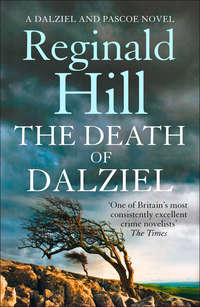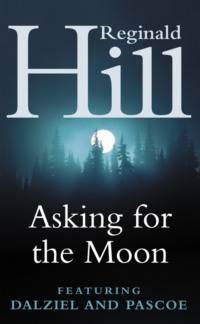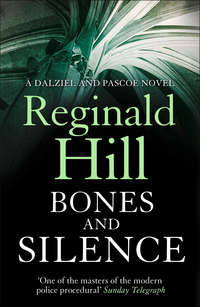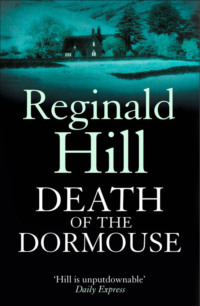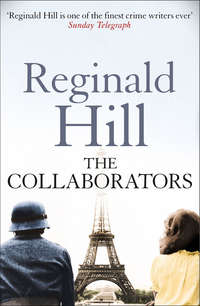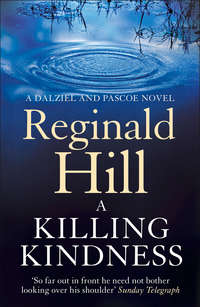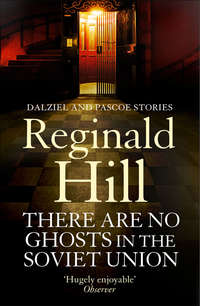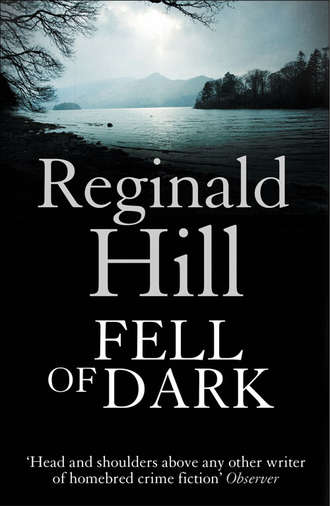
Полная версия
Fell of Dark
They both wore their hair long and might almost have been twins. The only instant way I saw of separating them was that Peter’s saviour wore a white bra and the other a deep blue one.
I must have stared too hard at the difference for suddenly White-bra giggled and put her hands up to her breasts. She was obviously nearer sixteen than the twenty-five her figure could have claimed. I noticed with a start her right hand had blood on it. From the sheep by the way of Peter, whose left arm was caked with a dusty red.
He stood up now.
‘Are you all right?’ the girl asked sympathetically.
‘Yes, thank you, dear,’ said Peter. ‘It was very gracious of you to help.’
He solemnly kissed her hand. White-bra giggled again and said something to Blue-bra in the language I had heard the previous night. Blue-bra giggled back.
I must have looked puzzled.
‘Olga’s my pen-friend, from Sweden,’ White-bra explained.
‘A fine country,’ said Peter, who had never been anywhere near it. ‘Thank you both again, for the help you have given me, and the spiritual stimulus you have given this old gentleman here.’
Well, you’re fully recovered, I thought, and set about dragging him away before his whimsy took him too far. He saw what I was at and strode ahead with a broad grin on his face. I murmured my own thanks and set off after him. After fifty yards or so, I glanced back and waved.
They waved back, two arms over four circles; two blue, two white.
I smiled at the thought of the odd impression they must have of us, and hoped we wouldn’t meet them again.
It was a hope the realization of which was never to give me any pleasure.
FOUR
We stopped twice more on our descent into Eskdale, the first time to eat the stringy ham sandwiches Stirling had probably picked personally to go into our packed lunch. To wash them down I had a super-sized flask which I had filled with iced lager by courtesy of Peter’s waiter. I mentioned this.
‘Clive?’ he said. ‘That was nice of him especially when we were in such disgrace.’
We laughed once more at the memory. Peter seemed to have recovered completely from the episode with the sheep.
Our second halt was in the valley. We had diverted slightly to have a look at Cam Spout as it poured down from Mickledore and had followed the stream down to Esk Falls where it mingled with another which came trickling down from Bowfell. Here the track levelled out and we were able to take our ease after the exertions of the steep descent. Eventually we reached a spot where the waters broadened into a pool about a dozen feet across. Peter decided he wanted to bathe. There was no one around, but I don’t think it would have mattered if there had been. Quite unselfconsciously he took off his clothes and stepped in.
‘Come on in,’ he said. ‘The water’s lovely.’
Prudence, or prudery, made me hesitate a moment. Then my clothes were off and I leapt in beside him.
Peter flung a handful of water at me with a laugh and next minute we were engaged in a splashing match which soon degenerated into a wrestling match. Eventually, half drowned, we relaxed again and let the sun warm all that was uncovered by the water. My eyes were closed, but suddenly I sensed a shadow on my skin and looking up I saw a man standing on the bank. He was dressed for walking and looked an imposing figure as he tood there, my angle of view making him seem taller than he was. His broad sunburnt face and thick grey-red beard added to the general impression of forcefulness and power. I was sure I had seen him before.
‘Good day to you,’ he said with a slight Scottish accent. ‘If I wasn’t so modest, I’d join you.’
‘Please do,’ I replied.
‘No, no.’ He grinned. ‘I’m getting old. I couldn’t stand the comparison. Good day.’
So saying, he touched his stick to the floppy hat he wore and strode away down the track.
Shortly after this, we clambered out and dressed ourselves. I noticed Peter did not put back on the shirt with the blood-stained sleeve, but replaced it by another.
It was only a few miles now to the village of Boot. There was a fairly large inn nearby with hotel pretensions in the summer. We were both now feeling very tired.
‘If,’ I said, ‘if they can fit us in, I suggest we leave the seaside till tomorrow. It won’t go away.’
By luck, there was a double room available, a cancellation, almost a miracle at this time of year, the manager assured us. An expensive miracle, it appeared when we enquired the cost. But I hadn’t got the will-power to go any further now.
We were shown upstairs to our room and I collapsed on the nearest bed and closed my eyes for a couple of seconds. Or so I thought.
When I woke Peter was standing over me dressed in his ‘respectable’ kit.
‘Come on,’ he said, ‘or we’ll miss dinner. I’ve been down already and it smells gorgeous.’
‘Borrowdale seems a million years ago,’ I commented as I sipped a well-diluted scotch in the bar.
‘Yes, doesn’t it? I bet it’s raining in Seathwaite.’
An anxious little waiter stuck his head round the bar door and waved at Peter.
‘Jesus,’ I said, ‘do you always make friends with the most unimportant members of the domestic staff?’
‘That,’ he said, ‘is Marco. He is Italian. He is here for the season. He is telling me that if we really want our dinner, we’d better get a move on or else the chef, a man with a vicious tongue and I suspect a gangrene on his shin will run amuck. I have ordered for you.’
We went in. Nearly everybody else was at the pudding stage. Over in a corner with a rather pretty young girl was the bearded man who had passed us as we bathed. His semi-formal attire made him look even more distinguished but older too. He must have been well over fifty at least.
He had his back to us but to my surprise the girl on seeing us enter reached over and touched his arm and he turned to look.
With the attractive smile I had remarked earlier, he waved genially, then returned to his food. The girl watched us to our seats, though not blatantly.
The mystery was explained when we sat down.
‘That,’ said Peter, with a flicker of his left cheek muscle in the direction of the bearded man, ‘is Richard Ferguson, the bird-man. With him is Annie Ferguson, the bird.’
‘His wife?’
‘His daughter, you fool. It’s no use looking for reassurance that your advancing years have not put you on the shelf. They’re v. devoted, almost incestuously so. His wife, I believe, is an invalid. Might even be dead.’
I had heard of Richard Ferguson, had even listened to a radio talk of his on one occasion when I had been too comfortable to reach out of my bath to change the station on my transistor. He was much sought after, so I gathered, as a broadcasting pundit. Some accident of chance had led the BBC to adopt him as one of their panel game and quiz team ‘characters’. It seemed almost incidental now that he was also one of the country’s leading ornithologists.
‘How did you meet him?’ I asked.
‘Introduced myself in the bar. When a man’s seen you naked, you’ve taken the first step to friendship after all.’
‘From the way his daughter’s looking at us, he’s obviously described the scene to her too.’
‘Well, it’s too good a tale not to be retold.’
Our soup arrived in the slim brown hands of Marco. I ate with gusto.
Peter’s suggestion that we had a couple of drinks in the bar after dinner I firmly refused. I left him there and watched the telly for a while, struck up a conversation with a couple from London, read half a page of the Daily Telegraph, then went to bed.
It had been a splendid day. I had a self-congratulatory sense of physical achievement. I was well fed, pleasantly sleepy and lay in a comfortable bed. To cap it all, a large yellow moon shone right outside my window. I saluted it and fell asleep.
I don’t know what time Peter came up but when the knock came at our door in the morning he was already up and dressed. He looked pale and told me as we went down to breakfast that he was suffering from sunburn as a result of our bathing party the day before.
‘I can’t walk today,’ he said. ‘I doubt if I’ll ever walk again.’
Marco’s smiling greetings had gone almost unacknowledged and the little Italian did not look at all happy when he brought us our bacon and eggs.
‘Not to worry,’ I grinned. ‘Today we go by train.’
Marco slammed Peter’s plate down in front of him. His thumb was in the fringe of the egg. As he removed his hand the egg came with it, then sliding free, it fell towards Peter’s lap. Peter with the casual rightness so hated by Jan lifted the edge of the tablecloth and caught the greasy object. He looked expressionlessly at Marco, then spoke.
‘Marco, can’t you organize something that makes sense out of this chaos?’
Marco’s underlip suddenly shot out and he began to gabble in Italian, lowly at first, but soon swelling in volume till everyone in the room was looking at us. Ferguson and his daughter, I noticed, had just come in and were standing by the door openly observing the scene with great interest.
Marco reached some kind of climax and halted. I thought of applauding, but a look at his face made me think again. He was very angry. Peter still sat there holding the tablecloth like a bridal train.
Ferguson moved over to us and spoke sharply in Italian. Marco caught the remnants of the egg up in his hand, flung it on to the plate and strode away to the kitchen.
‘Thank you,’ said Peter, releasing the tablecloth and standing up, partly to avoid the last oozings of the egg yolk, partly in acknowledgment of Miss Ferguson who was hovering behind her father. ‘That was kind. May I introduce my friend, Harry Bentink.’
‘Hello, Bentink. We have met in a manner of speaking. And I heard a great deal about you last night.’
‘How do you do,’ I said, half standing up with a bit of fried bread impaled on my fork which I waved nonchalantly at the girl. The bread fell on to the table.
‘You’re not having much luck with this table, are you?’ said Ferguson. ‘Come and share ours.’
He did not stay for an answer but moved across to the corner where he had been sitting the night before. We followed.
‘My daughter, Annie,’ he said. The girl smiled politely but said nothing. I got the impression she was scrutinizing me very closely behind her impassive façade.
‘Are you here on holiday or business?’ I asked.
‘Bit of both,’ he said. ‘Never know what you’ll see on the mountains.’
‘That’s true,’ said Peter in what I recognized as his facetious tone. ‘We saw a blue and a white tit only yesterday, didn’t we, Harry?’
He kicked my leg gleefully under the table. I lashed back and caught the girl’s ankle. She drew away in greater unease than I felt the situation warranted.
‘Sorry,’ I said.
‘That’s all right,’ she said. ‘Will you excuse me?’
She rose and left. She’d only had a thimbleful of grapefruit juice. I let my practised eye recreate the limbs under the skirt as I watched her go through the door and smiled approvingly.
She did not come back and we finished the meal practically in silence.
Replete, Ferguson folded his napkin neatly, looked at each of us in turn and asked, ‘What are your plans today?’
‘We’re going to see the sea,’ said Peter. ‘But first we’re going on a mysterious train journey.’
Ferguson laughed.
‘Oh, Lile Rattie,’ he said.
‘What?’ said Peter.
‘The miniature railway. It’s great fun if the weather’s fine. And it runs to time.’
Peter looked across at me and raised his eye-brows apologetically at having spoilt my surprise. I grinned back and looked suggestively at my watch. He nodded.
‘Well, Mr Ferguson, thank you for the use of your table. We must be off, however, while the day is young.’
We all stood up and shook hands.
‘Enjoy yourselves,’ said Ferguson.
‘You too.’
As we went out of the dining-room I looked at Peter curiously.
‘Why didn’t you answer Marco?’ I knew he spoke excellent Italian.
He shrugged.
‘He was just being rude.’
‘What did Ferguson say to him, then?’
Peter laughed.
‘He told him to bugger off or risk losing his unmentionables!’
Half an hour later we were striding down the road into the railway station. More than a station, it is a terminus and the incongruity of both setting and proportion have always endeared the place to me. Peter looked without comment at the narrow track and the low platform. There were not many people around at this time of the morning, I mean not many waiting to catch the train to Ravenglass, though when the train itself arrived it was quite full of trippers and hikers. They got out and dispersed. We put our knapsacks in one of the tiny open compartments and walked up the track to inspect the locomotive. Peter examined everything very closely, full of amused delight.
‘It’s marvellous, isn’t it?’ he said. ‘It’s not an intrusion into the place. Not like all those bloody motor-cars you find parked all over the place. You could run up Helvellyn in something like this and even Wordsworth wouldn’t object.’
The exhilaration of feeling the rush of air on your face, of being able literally to lean out and pick flowers as you pass is almost indescribable. Perhaps the sense of inhabiting in reality for a while the imaginative world of childhood has something to do with it. Certainly the (so it seemed) inevitable sun, the royal blue sky, the smell of things growing, to which the occasional whiff of steam or smoke seemed a natural addition, all these contributed to the enchantment of the moment. Peter looked like a child on a perfect birthday.
‘Thalatta, thalatta,’ he murmured softly to himself, eyes straining ahead to take everything in. ‘Soon we will see the sea.’
I nodded happily, acquiescingly. Soon we would see the sea.
Beckfoot came and went. Then Eskdale Green, Irton Road and the descent down the flank of a wooded fell to Muncaster. All too soon it seemed our journey was over and the sturdy little engine pulled us round an easy bend into the Ravenglass terminus.
I sat back for a few seconds, reluctant to move. But Peter was already on his feet.
‘Come on,’ he said. ‘I can smell it.’
‘All right.’ I took my knapsack and we walked slowly up to the small booking-kiosk and the exit.
There were two men standing by the gate. They were dressed in rather shabby grey suits cut in a style that was archaic by London standards and must have been a bit behind the times even for Ravenglass.
One was reading a newspaper. The other, a smaller, altogether less restful-looking man, registered our approach and touched his companion on the arm. I was reminded of the Fergusons when we came into dinner the previous night.
The larger man glanced up, folded his newspaper into a squat little packet and thrust it into his jacket pocket. The anxious little man was already heading towards us. The big man strolled in his wake.
‘Not more waiters, I hope,’ I said to Peter.
He laughed. ‘Not mine if they are.’
It was obvious that the men were heading for us. There hadn’t been many people on the train and most of those had already disappeared.
‘I think they are policemen,’ said Peter.
I felt a sudden panic. To intercept us on holiday like this meant something pretty urgent. Something at the office? Hardly. A fire at home? Something happened to Jan?
‘Mr Bentink? Mr Thorne? We are police officers, I am Detective-Constable Armstrong and this is Detective-Constable Lazonby.’
Peter and I nodded inanely. For a moment, overlaying worry, came the thought of how amusing it would be if we all shook hands and then went our separate ways. But only for a moment.
‘We wonder if you would mind helping us in some enquiries we are making.’
‘Certainly, if I can,’ said I, my relief that none of my personal fears seemed to be realized making me more enthusiastic than I normally am in my dealings with the police.
‘Thank you, sir,’ said little Armstrong. ‘Then if you’d come this way. We have a car.’
‘Wait a minute,’ I said. ‘Can’t we chat here just as easily as in a car?’
Armstrong stood on his toes in his anxiety.
‘I wasn’t thinking of talking in the car, Mr Bentink.’
‘No,’ said Lazonby in a much less conciliatory tone. ‘We’d like you to come to the station.’
I didn’t like the sound of that, but what followed I liked even less.
‘In Keswick,’ added Armstrong with reluctant honesty.
‘Keswick!’ Peter screeched.
‘Yes, sir,’ said Armstrong. I found to my surprise we were moving quite rapidly towards the car-park.
‘Detective-Superintendent Melton would like you to assist him with an enquiry he is in charge of.’
Superintendent. I knew enough to know this meant it wasn’t trivial.
‘Look here,’ I said. ‘Just what is this case, and how can we help?’
Armstrong looked at Lazonby with dog-like appeal.
‘Detective-Superintendent Melton is in charge of the investigation into the deaths of Miss Olga Lindstrom and Miss Sarah Herbert. He thinks you may be able to help him with his enquiries,’ recited Lazonby.
‘Which girls? Oh, not those girls – the Swedish pen friend and – but how did they die? An accident on the fells?’
‘Accident?’ said Lazonby. ‘If you can strangle somebody by accident, and rape them by accident, then it might be a bloody accident. Come on.’
Stunned, we followed. A few minutes later we were in a police car on the road to Keswick.
Some time later as the car began to labour up into the fells we thought we had turned our backs on, it began to rain.
FIVE
We had been driving for more than half an hour before I summoned up courage to speak. I prefaced it with an offer of cigarettes. Lazonby accepted.
With an effort to sound casual (an effort all the harder because of my sense of how stupid it was that I should have to try at all) I asked, ‘What exactly happened to the girls?’
Lazonby took so long in replying that I thought he was just going to ignore the question. But finally he said, ‘Exactly, we don’t know. But we will know, eventually. At the moment all we know is that some time last night they were raped. Then strangled. Then thrown in a gully. Probably in that order. That’s all we know.’
He looked me full in the face.
‘But it’s enough to be going on with, don’t you think, Mr Bentink?’
I nodded foolishly and decided to try to turn the conversation yet again.
‘What kind of man is Mr Melton?’ I asked.
Lazonby thought a long time about this too.
‘He’s a good policeman. Oh yes. He’s a good policeman,’ was all that he said in the end.
But now we were fast approaching Keswick. The rain was still beating down on the windscreen almost too hard for the wipers to clean a space, but Armstrong kept his foot down on the accelerator. This seemed rather out of character for so nervous a man, but I caught him glancing at his watch, and guessed that some kind of deadline was involved. I was recovered sufficiently to be able to smile wryly at the thought of deadlines in a murder case.
My new complacency was shattered, however, as we pulled into the small courtyard of the Keswick police station. Despite the rain, a small crowd had gathered there and as I got out of the car, I was horrified to hear from two or three throats a low baying noise, half growl, half boo, which rose in volume as Lazonby seized me by the arm and hustled me into the building.
I wrenched my arm away from him and asked in some anger, ‘What do you think you’re doing? And what was all that din about?’
Lazonby looked apologetic, or at least as apologetic as his solid impassive face permitted.
‘I’m sorry, Mr Bentink, but you always get a funny type of person hanging around the station on cases like this. They want a glimpse of the murderer. I had to rush you in. There was a photographer there, and I’m sure you didn’t want your picture in the papers, did you?’
‘Why no,’ I said, still feeling uneasy about the whole incident. I looked around.
We were standing in a kind of foyer about twelve feet square. There was a counter running the length of it, topped by frosted glass with a couple of compartments in it, like the windows of a railway booking office. One of these was open and through it two uniformed policemen eyed us with undisguised interest. The door which led through this partition into the office behind it opened and a sergeant came out. Armstrong stepped forward and spoke to him. He nodded and disappeared again.
‘Won’t keep you a moment,’ said Armstrong brightly, obviously pleased at the prospect of getting rid of us.
I turned to Peter. He had slumped down on to the bench which ran along the wall opposite the partition. He looked, I thought with horror, the picture of guilt overtaken by conscience. But before I could think what to do to rearrange this allegorical picture, a door opened at the far end of the room and through it came Marco.
He stopped dead when he saw Peter. I might not have been there. Then he set off for the exit door and I thought he was going to rush through it without a word. But he stopped with his hand on the knob, turned and looked down at Peter who stared back with no discernible emotion on his face, then cried:
‘Pardon me, Peter. I was so angry.’ This was followed by a few sentences in very rapid and emotional Italian, then he flung open the door and rushed out.
Peter, with one of those rapid transitions of mood which I realized I had noticed previously but which only now began to cause me some unease, looked up at me and winked. I glanced round quickly to see if anyone had noticed. The two constables behind the counter were chatting away to each other with great verve, Lazonby was staring thoughtfully at the door which was just swinging slowly shut on its spring. Armstrong was looking to the other end of the room where in the open doorway through which Marco had appeared stood a new figure. He was looking straight at Peter.
Something told me immediately this was Melton. Yet he looked nothing like my mental picture of the man. Perhaps I had been conditioned by television, but I had expected a large man, solid, impassive and like Lazonby except larger and cleverer. But this man was nothing like that. Short, thin, wearing an ill-fitting blue suit and, most unsuitably in every sense of the word, a green and orange checked waist-coat, he had a triangular face swelling from a narrow chin to broad expanse of forehead, accentuated by a far-receded hairline. He wore spectacles, round, cheap-framed, with bi-focal lenses.
He stepped into the room.
‘Emotional creatures, these foreigners, aren’t they? Mr Bentink? Mr Thorne? Thought I had you spotted. Yes, emotional. Easily upset. Show it all. Not like you and me, Mr Thorne, eh?’
His voice was high-pitched, but perfectly controlled, lacking entirely the over-rapid pace and near squeakiness of the normal high male tone.
‘It’s good of you to come. I’m Detective-Superintendent Melton. We’ll try not to keep you any longer than is necessary. Though on a day like this you might as well be here as anywhere, eh?’
‘It was sunny in Ravenglass,’ said Peter in a childishly sullen kind of voice.
‘Yes, yes. I dare say it was. Come along now.’
He turned and walked back through the door. We followed him into a long corridor with several doors leading off. One of these was open and sitting behind a desk there was a figure cast much more in the mould I had expected. He was a big solid man, about sixteen stones of him I reckoned; he made Lazonby seem a puny youth.
‘Ah, Inspector Copley. Just the man. I wonder if you would have a chat with Mr Thorne here and take his statement. In you go, Mr Thorne.’


